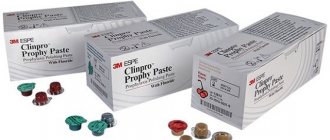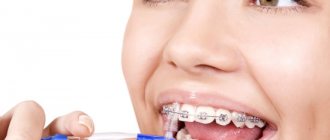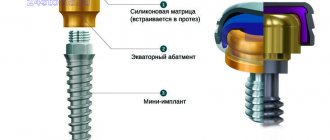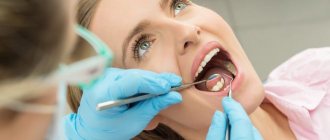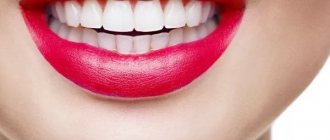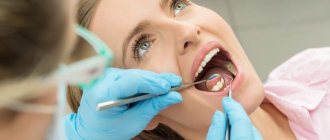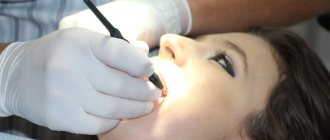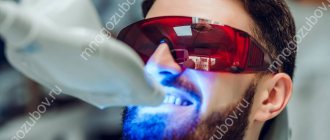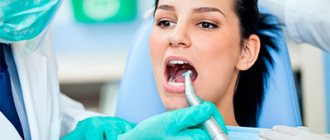How is whitening different from professional teeth cleaning?
Professional oral hygiene is the mechanical removal of pigment, plaque, and deposits from the surface of tooth enamel. At the same time, the teeth retain their natural shade. Whitening is a chemical process that removes pigmentation inside the tooth, in the enamel and dentin. In this case, the tooth changes its color to whiter. Before whitening, you need to have clean teeth, so you will have to undergo professional oral hygiene before the whitening procedure.
What is Air Flow cleaning?
Important! Air Flow is an effective whitening method, during which a stream of a special solution is directed at the teeth under increased pressure.
For some reason, many people think that this cleaning method is a rather unpleasant procedure, but after they fully learn about it, their opinion completely changes. The thing is that during this procedure no chemicals or aggressive substances are used, so during it the risk of damage to the enamel is reduced. The cleansing process itself takes quite a bit of time. It is quite simple and easy, and has an increased degree of safety for the patient. This gentle procedure allows you to eliminate not only soft plaque, but also hard stone deposits. Usually, after this cleansing method, the enamel brightens by several shades at once. However, for those who want to get bright and snow-white teeth, this whitening method is not suitable
Types of whitening and how they differ from each other
There are several types of whitening: home, clinical (professional) and intracoronal. Professional whitening is the fastest way to get results. The procedure lasts about an hour and is carried out under the supervision of a doctor using equipment to activate the whitening gel (laser or special lamps). Intracoronal whitening is also performed by a doctor on only one tooth that has changed color - for example, after injury or root canal treatment. Home whitening takes from several weeks to a month. In this case, mouthguards and whitening gel are more often used. Whitening pastes are ineffective and you cannot achieve a noticeable result with their help.
Contraindications
Just like any other teeth cleaning procedure, Air Flow brushing has some contraindications. You should not perform this procedure during them, otherwise unpleasant problems may arise. It is not advisable to carry out cleaning under the following contraindications:
- the presence of symptoms of asthma or bronchitis in chronic form;
- if you are allergic to the smell and taste of citrus fruits;
- if the patient follows a salt-free diet. The solution used for cleaning partially contains salt;
- if you have periodontal disease or increased sensitivity of teeth;
- should not be used for children and adolescents under 16 years of age;
- period of bearing a child;
- when breastfeeding a child.
It is recommended to carry out this procedure twice a year. Before cleaning with the Air Flow method, the doctor must carefully examine the oral cavity. The doctor must make sure that the patient has no contraindications to this cleansing method.
What sensations can you expect from the procedure?
During whitening, there is most often no sensation, but mild discomfort and tingling may occur. The sensations depend on several factors: the thickness of the enamel, the presence of cracks in the enamel, and tooth hypersensitivity. If you know that your teeth are hypersensitive, then two weeks before whitening you need to undergo a course of remotherapy (a procedure that normalizes the mineral composition of tooth enamel) and repeat it for two weeks after.
Benefits of Air Flow
Air Flow cleaning has many positive qualities, which is why it has recently become quite popular. The most important positive qualities of this cleansing method include the following:
- During this procedure, the patient feels light;
- Abrasives do not cause any damaging effects on the enamel structure, but at the same time they clean and brighten it quite well;
- The cleaning process is performed under controlled water pressure, which protects the oral gum tissue from damage;
- Using this cleaning method, you can return your teeth to their original natural white color;
- The duration of the procedure is short – only 30-45 minutes;
- This cleaning method does not have a harmful effect on the structure of tooth enamel, so remineralization is not required after it;
- There is no increase in tooth sensitivity, as well as the degree of response to various external reactions;
- Does not cause allergic reactions;
- Can be used even by those who wear braces, implants, crowns;
- Prevents the development of dental caries and various gum diseases.
How do you know what color you will get after bleaching?
We know that teeth with a yellow tint can be whitened very well. Teeth with a gray or gray-blue tint, as well as teeth with tetracycline staining (discoloration of teeth due to taking the antibiotic tetracycline), fluorosis (a chronic disease that develops with prolonged ingestion of water or products with a high content of fluoride compounds), are difficult to whiten. hypoplasia (insufficient development of enamel). The results of whitening are affected by the age of the patient and the reason for the staining of the teeth.
How is it carried out?
Many people are interested in how the Air Flow purification process is carried out. In order to understand how this procedure is performed, it is worth considering its main features:
- The main effect of this procedure is to apply a strong pressure of the solution to the area of plaque, which is located on the dental units;
- The solution used for the Air Flow procedure contains medicinal substances. The healing elements are based on compressed air, abrasives and water;
- Due to the strong pressure, the jet removes particles of pigmentation and plaque from the teeth. The jet is able to completely clean out all deposits even in the interdental spaces;
- In this procedure, ordinary water is used as an abrasive agent, so there is no negative impact on the structure of the teeth.
How much does teeth whitening cost at a dentist at the GDenta clinic?
The cost of teeth whitening is an important factor that interests patients along with the effectiveness and safety of the procedure. Modern advances in aesthetic medicine make it possible to perform teeth whitening inexpensively, without sacrificing either quality or effectiveness. Contact our clinic and see that you can solve the problem of yellow teeth for relatively little money.
Patients of our clinic have the opportunity to choose the appropriate whitening option that will meet their financial capabilities and expectations from the procedure. Are you unsure about your choice? Ask your question to our online consultant or personally to the doctor during your appointment. We provide assistance from highly qualified professionals and guarantee the quality of each service.
The cost of each whitening procedure in our clinic includes hygienic cleaning with a special paste, which will prepare the oral cavity for whitening, as well as a final coating with remineralizing gel.
We work to make you smile!
average price
Need to know! The price for the photobleaching service is determined depending on the following factors:
- City – in Moscow and St. Petersburg prices are significantly higher than in the regions.
- The reputation of the clinic - the more highly qualified doctors and better equipment the clinic has, the higher the price tag. This is exactly the case when the price justifies the quality.
- Methodology used. For photo whitening Zoom the price tag varies from 15,000 to 25,000 rubles, for Beyon Polus - from 10,000 to 20,000 rubles, and for Luma Cool - from 6,000 to 14,000 rubles.
Remotherapy
This is a course of procedures that strengthen weakened enamel, restore the cellular structure of hard tissues, and saturate them with minerals. Remineralization of enamel helps reduce its sensitivity and reduces the risk of damage or caries. Dentists at the DentoSpas clinic recommend performing it before whitening if there are signs of weakening of the enamel (high sensitivity, reaction to temperature stimuli, sour or sweet foods, noticeable changes in the structure of hard tissues). It is also advisable to carry out remotherapy if a large amount of tartar has been removed during professional hygiene, if the enamel underneath shows signs of changes in structure or caries in the white spot stage.
You have questions?
We will call you back within 30 seconds
+7
What is photo teeth whitening?
Many people know the meaning of the Greek word “photos”, so they guess that light is involved in photobleaching. But what role does he play? Maybe this will be a discovery for some, but teeth are “translucent” with the usual halogen, ultraviolet or LED lamps. Can they change the color of teeth? Obviously not. Photobleaching involves the use of a special gel with 30–35% hydrogen peroxide, the effect of which is enhanced by light, which significantly speeds up the bleaching process.
Home whitening
The method is suitable for those who want to whiten their teeth without risk to health and save a lot of money. However, before using whitening at home, it is recommended to consult a dentist to avoid mistakes when choosing the appropriate product and in the process of using it.
Home whitening systems with trays
Gel with individual trays for home whitening is issued in dentists after consultation with a doctor. Simpler sets with standard mouth guards can be purchased at the pharmacy. Due to the low concentration of hydrogen peroxide or urea in the gel, teeth are lightened by 5 to 8 tones. The price of the set varies from 2,000 to 7,000 rubles. The cost of making an individual mouthguard will be about 6,000 rubles.
Stripes
The devices contain a gel with a small content of hydrogen peroxide. The strips are applied to the teeth for about 30 minutes for a month. The effect is lightening by 3 – 5 tones. The cost of the kit is from 1,000 to 4,000 rubles. Perhaps the most effective means of this type will be Crest strips.
Gels and varnishes
The teeth are coated with a whitening agent with remineralizing components using a brush or brush. As a rule, the solution does not require rinsing and is used regularly for two weeks. Teeth become 1–2 shades whiter. Purchase costs will range from 300 to 1,000 rubles. One example of such products is the Blanx whitening pencil.
Whitening pastes
Toothpastes, rinses, brushes and flosses with a whitening effect in rare cases “increase” whiteness by a maximum of 1 tone. Experts recommend using such products to maintain the results of professional whitening. The simplest whitening paste can be bought at an affordable price - from 150 rubles. Low-abrasion toothpaste with a brightening effect, Extreme Whitening Swissdent, will cost more.
How to contact exactly the one who can give you the right advice about veneers or whitening?
A little bit of my advertising and let's continue:
I, an orthopedic dentist with more than 10 years of successful experience, Sergey Samsakov, will help restore the aesthetics of the frontal units, correct deficiencies in a way that will be appropriate in your case. I will perform unique individual veneers, or carry out a professional cleaning procedure using ultrasound and/or Airflow technology. Sign up for a consultation and we will choose a way to make your smile area beautiful and healthy. Look what beautiful smiles have already found their patients:
Reviews about the procedure
Below are some reviews. If you have something to say, leave your feedback in the comments below the article, it will be useful to our readers.
Marina, Moscow.
Teeth are my sore subject. They are naturally yellowish, plus I simply cannot imagine myself without coffee. I was thinking about getting veneers or whitening my teeth. In the end, I chose the second one and did not regret it. It’s been 3 months since I became the owner of a Hollywood smile! Despite my enormous fear of dentists, I endured the procedure calmly - I just lay there while the lamp did its job.
Rinata, Novosibirsk.
My daughter had her teeth photobleached - she wanted to look 100% at her prom. My teeth certainly became whiter, but terrible sensitivity of the enamel appeared. For the first week after going to the clinic, my daughter could not eat or drink anything without wincing in pain. She said that she liked the effect, but she was no longer ready to make such sacrifices for the sake of beauty. Now maintains the result with professional cleaning.
A smile is our everything! Where are we now without an image, huh?
The health and aesthetics of the smile area are important both as an image component and as an opportunity to preserve natural teeth and prevent their premature destruction. A question asked by patients: “Is it better to get veneers or teeth whitening?” not entirely correct. There are situations when only veneers will help or the natural shade of enamel can be returned by performing a professional hygiene procedure. It all depends on the condition of the teeth and the result the patient wants to achieve.
To make the right choice, be sure to listen to your dentist's recommendations.
Advantages and disadvantages
The procedure has gained worldwide fame precisely thanks to its extensive list of advantages :
- Quick results - just one hour-long session and teeth become 10-12 shades lighter.
- Durability – the result lasts from 1 to 3 years.
- safety – compared to older enamel lightening methods.
Keep in mind! But it was not without its drawbacks:
- Temporarily makes teeth more sensitive - this causes discomfort during meals.
- Does not lighten fillings, veneers, dentures and crowns - they will need to be changed after whitening.
- It is quite expensive - which for many is a decisive factor for refusal.
Causes of yellowing of enamel
The first step is to understand why your teeth have acquired an undesirable shade. The subsequent choice of preparation and whitening procedures depends on this. To be honest, the yellow tint is a healthy shade of teeth, but over time it can become more intense. This mainly occurs due to insufficient hygiene, plaque accumulation, as well as consumption of food and drinks containing a lot of coloring substances (black tea, coffee, red wine, beets, some berries, chocolate, etc.). In this case, any professional in-office or home whitening will work, and as preparation it is necessary to carry out special cleaning, which we will discuss later.
But there are more complex reasons that can cause teeth to acquire an unnatural color. These include:
- taking antibiotics;
- tooth injury due to impact;
- unsuccessful canal filling;
- various diseases.
In this case, you will first have to treat the body, stop taking medications, eliminate injuries, and so on. This preparation may require a lot of time, but without it the whitening procedure will not be effective.
What effect does this have?
Photo teeth whitening is a fairly effective technique. During one visit to the dental office, it is possible to lighten the enamel up to 8-12 shades. But the result itself and its duration are individual for each patient. If a person has a natural yellowish tint to the enamel, then cold light bleaching will be very effective. At the same time, if the surface of the teeth is gray, then this technique will help whiten it only a few shades.
If the cause of darkening of the enamel lies in excessive consumption of coffee, coloring drinks and smoking, then the patient has every chance of returning his smile to its dazzling whiteness. But if the teeth have changed color after taking tetracycline antibiotics or excess fluoride, then the chances of success are minimal.
It is important to remember that about 5% of the population have special tooth enamel that is not amenable to modern whitening methods.
